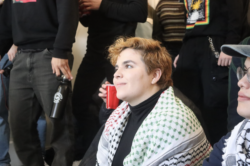Georgetown Solidarity is launcing a campaign to raise the pay of Department of Public Safety officers. The campaign coincides with ongoing contract negotiations between Allied International Union, which represents DPS officers, and the University. The last contract, which raised DPS officers’ pay by $2.50 to $15.60 per hour, was signed two and a half years ago. The increase came after what Allied International called “tenuous negotiations.”
DPS officers are the lowest paid university police officers in the District. This wage disparity has incited Solidarity to launch its campaign, which will kick off with a rally in Red Square tomorrow.
“We’re not talking about this so much in terms of numbers,” Solidarity member Joe Parker (SFS ’10) said. ”The important point is … the officers who are on their jobs everyday have said [this pay increase] is what we need.”
The campaign has been in motion for weeks now, with members of Solidarity writing letters to University officials and spreading the word about the contract negotiations.
After the recent incidences of harassment towards members of the LGBTQ community, Solidarity sees a connection between the low pay for DPS officers and the spate of assaults in the past few weeks.
“DPS officers are undervalued because they are paid so little,” Solidarity member Rob Byrne said. “Because you don’t have that value placed on your job, you’re really not inclined to take your job as seriously.”
DPS officers also have a high turnover rate, with many moving on to more lucrative positions with the Metropolitan Police Department or at other college campuses. At a public safety forum held last week, Vice President of University Safety Rocco DelMonaco admitted that there was a high turnover rate among DPS officers. However, DelMonaco suggested it was due to the fact that Georgetown attracts many highly-qualified young officers who eventually are attracted to work requiring more qualifications.
Solidarity argues that if the officers’ contract demands are met, officers will feel more respected in their jobs, leading to better performance and a smaller turnover rate.
University officials have refused to comment on the contract negotiations, saying they have agreed not to discuss the process until it is completed. The Allied International Union said that while the University has indicated they are not opposed to a pay increase, there is a disagreement about how large the raise should be.
At its rally tomorrow, Solidarity hopes to increase public pressure on University administrators to meet union demands.




